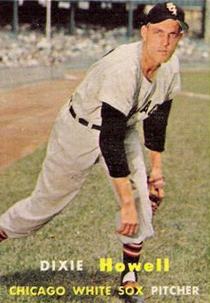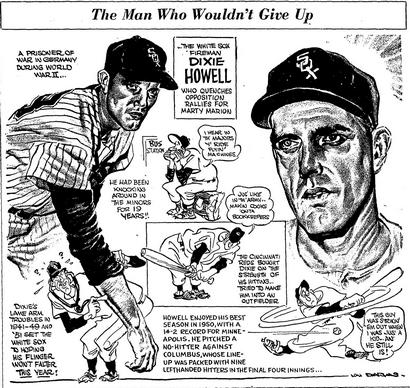

Millard “Dixie” Howell
Date and Place of Birth: January 7, 1920 Bowman, Kentucky
Died: March 18, 1960 Hollywood, Florida
Baseball
Experience:
Major League
Position: Pitcher
Rank: Private First Class
Military Unit: 60th Infantry Regiment, 9th Infantry Division
US Army
Area Served: European Theater of Operations
Major League Stats: Millard Howell on Baseball-Almanac
 Millard “Dixie” Howell was born on January 7, 1920 in Bowman,
Kentucky. His family moved to the coal mining town of Dehue, West
Virginia.
Millard “Dixie” Howell was born on January 7, 1920 in Bowman,
Kentucky. His family moved to the coal mining town of Dehue, West
Virginia.
After quitting grammar school in the eighth grade, Howell played for the local town team. “I always liked to play baseball with the older fellows,” he told The Sporting News on September 14, 1955, “and in those days I would play in the outfield, pitch or in the infield … anywhere just so I could get on the team.”
The local mine foreman recommended the right-hander to the Logan Indians of the Mountain State League in 1937, and he finished the season with a 13-11 won-lost record and played right field when he wasn’t pitching. It was also the year he picked up the nickname “Dixie.”
“I was something of a favorite of the colored folks who would come out to the games,” he recalled, “and whenever I would come to bat, they’d holler, ‘Come on, Dixie,’ and I guess the name just stuck with me.”
At the end of the season Cleveland bought his contract and assigned him to the Leaksville-Draper-Spray Triplets of the BiState League for 1938. He was with the Wilkes-Barre Barons of the Eastern League in 1939 establishing a league single-game strike out record with 20 and posting a 12-12 record. Despite being regarded as one of the finest prospects in the Cleveland chain and a brief stint with the Indians in which he made three major league relief appearances at the close of the 1940 season, recurring illness and a sore arm kept the youngster from reaching his potential.
In March 1943 he was purchased by the Cincinnati Reds and assigned to the Syracuse Chiefs of the International League. Howell helped the Chiefs win the league pennant with 13 victories against nine losses and was scheduled to join the Reds in the spring of 1944.
But on November 23, 1943, Howell entered military service with the Army. He was assigned to an infantry training unit at Camp Wolters, Texas and was then at Camp Shanks, New York before leaving for Europe.
Advancing with the 60th Infantry Regiment of the 9th Infantry Division through Belgium on September 6, 1944, Private First Class Howell and other infantrymen had to cross the River Meuse in boats because all bridges had been destroyed by the retreating German troops. On the other side of the river they were surprised by enemy troops and 150 Americans, including Howell, were taken prisoner.
Howell, who was married with two young daughters at the time, was taken to the Stalag VIIA prisoner-of-war camp at Moosburg, Germany – about 40 miles northeast of Munich. “In the morning,” he said, “we got nothing except bad coffee. The noon fare was usually some sort of soup and in the evening we'd get minced ham … the fellows called it horse meat … potatoes and bread.
 "The Red Cross
would give us chocolate bars and other things hard to get and some
of us would trade these things for bread. The camp officials would
deal out the bread about five men to a loaf.
"The Red Cross
would give us chocolate bars and other things hard to get and some
of us would trade these things for bread. The camp officials would
deal out the bread about five men to a loaf.
"If you worked at cleaning up the buildings, on the farms or on the railroad, you would get better food.
"We slept on straw beds without adequate covering, so we would use our clothes to help keep warm at night.
"But I stood it all pretty good and I don't think I lost much weight. We didn't realize how near the war was to ending. Now and then we would get information from the guards, but it was never accurate."
In April 1945, Howell – 75 pounds lighter than his usual 210 – was liberated by advancing Allied forces. He returned to the United States and was discharged from military service on November 8, 1945.
Howell went to spring training with the Reds in 1946, but having been away from the game for two years he found himself back with Syracuse for the regular season. He spent four years with the Chiefs and was 17-12 in 1948. In 1949, he got another taste of the major leagues, pitching in five games with the Reds.
Howell was purchased by the New York Giants in 1950. He was now 30 years old and pitched for the Minneapolis Millers of the American Association. It was to be an exceptional season for him. He had a 14-2 won-lost record and threw a 6-0 no-hitter against Columbus on August 10.
But still there seemed no chance of a return to the major leagues and arm problems made him consider retiring before returning to the Millers.
1952 was a bizarre year for Howell. He was purchased by Philadelphia Phillies in January, but returned to the Giants in May. A week later he was purchased by the White Sox for $2,500, and assigned to the Memphis Chicks of the Southern Association where his timely relief pitching led them to the Dixie Series title.
Howell remained with the Memphis Chicks in 1953 and 1954, before returning to the major leagues in 1955 with the White Sox. Now a relief specialist, Howell appeared in 35 games for Chicago and was 8-3 with a 2.93 ERA. After 18 years of professional baseball, Howell had finally become a major league regular and spent three seasons on the White Sox staff. He made his last major league appearance on April 26, 1958. He was 38 years old.
Howell returned to the minors and pitched for the Indianapolis Indians of the American Association in 1958 and 1959.
On March 18, 1960, at the Indians’ spring training camp in Hollywood, Florida, Howell complained of chest pains after doing some running at about 2pm. A doctor ordered him to a hospital where, just three hours later he died from a heart attack. He was just 40 years old.
Millard “Dixie” Howell is buried at the Oaklawn Cemetery and Mausoleum in Wilkes-Barre,
Pennsylvania.
Created August 28, 2007. Updated September 21, 2007.
Copyright © 2015 Gary Bedingfield (Baseball
in Wartime). All Rights Reserved.